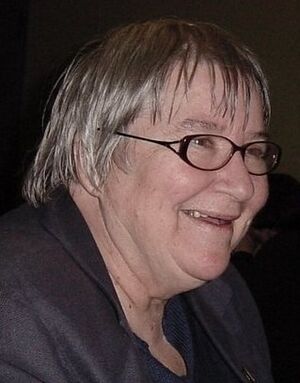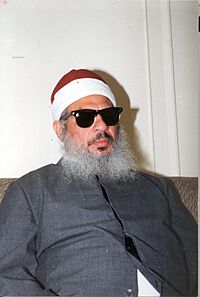Lynne Stewart facts for kids
Quick facts for kids
Lynne Stewart
|
|
|---|---|

Lynne Stewart in 2007
|
|
| Born |
Lynne Irene Feltham
October 8, 1939 Brooklyn, New York, U.S.
|
| Died | March 7, 2017 (aged 77) Brooklyn, New York, U.S.
|
| Education | Rutgers School of Law–Newark (JD) |
| Occupation | Defense attorney |
| Spouse(s) | Ralph Poynter |
| Children | 5 |
Lynne Irene Stewart (October 8, 1939 – March 7, 2017) was an American lawyer. She was known for defending people in important and sometimes difficult cases. Later, she was found guilty of helping one of her clients pass messages. This meant she could no longer work as a lawyer. She was sentenced to prison for a time.
Her sentence was later changed to a longer period. She served her time at a federal prison in Fort Worth, Texas. Lynne Stewart was released from prison on December 31, 2013. This happened because she had a serious illness, and the court allowed her to go home.
Contents
Early Life and Education
Lynne Stewart was born in Brooklyn, New York. Her mother had German and Swedish family, and her father had English and Irish family. She grew up in Bellerose, Queens. She finished Martin Van Buren High School in 1957.
She went to Hope College in Holland, Michigan, but did not finish her degree there. In 1961, she earned a Bachelor of Arts degree in political science from Wagner College on Staten Island. She then studied law at Rutgers School of Law–Newark in Newark, New Jersey. She earned her law degree in 1975. By 1977, she was allowed to practice law in New York.
Stewart believed that sometimes strong actions were needed to fix unfair systems. She often spoke at universities about fighting against unfairness in society.
Her Career as a Lawyer
Lynne Stewart became a lawyer in New York on January 31, 1977. For most of her career, she helped many clients who did not have much money. She also took on several well-known cases. Stewart called herself a "movement lawyer." This meant she was interested in helping her clients with their wider political goals, not just their specific legal problems.
Stewart believed that her famous clients were all trying to change unfair systems. She said they were revolutionaries or people whose cases showed unfairness. A former US Attorney, Andrew C. McCarthy, said that Stewart was "reasonable and practical." He also said that when she promised something, she kept her word.
The Abdel-Rahman Case
After the 1993 World Trade Center bombing, the FBI started looking into Omar Abdel-Rahman. He was also known as the Blind Sheikh. The FBI found that Rahman had encouraged violent acts against US targets. He was arrested in June 1993. The planned targets included the United Nations Headquarters and several tunnels and bridges in New York. There were also plans to bomb Jewish places and harm some politicians.
In November 1994, former US Attorney General Ramsey Clark asked Stewart to represent Rahman. Stewart was not sure at first. But Clark convinced her, saying that the Arab world would feel let down if she did not take the case. Stewart told the Washington Post that she thought the fundamentalist movement was the only hope for change in Egypt.
During Rahman's trial, Stewart argued that he was being blamed for his political and religious ideas. She said he was not guilty of planning violent acts. Rahman was found guilty in October 1995. He was sentenced to life in prison in 1996. Stewart was reportedly very upset by the jury's decision.
Special Rules for Communication
When Stewart defended Rahman, she had to follow special rules. These rules were called "special administrative measures" (SAMs). They controlled how she could talk with Rahman in prison. Stewart agreed not to use their meetings to pass messages between Rahman and other people, including the media. These SAMs were changed after the September 11 attacks. They were meant to stop messages that could harm US security or lead to violence.
Later, Stewart was accused of breaking these rules. It was said that she, along with an interpreter and a postal clerk, passed messages for Rahman. This was seen as trying to trick the US government. Stewart was accused of passing Rahman's approval for more actions to his supporters in Egypt. Video showed Stewart, the interpreter, and Rahman talking. Stewart even joked that she should get an award for acting, as they were trying to make it seem like a normal conversation.
Stewart said the problem was about one message she passed for her client to his supporters. This message was in a Reuters article. She then sent a clarification because it seemed to be misunderstood. She said Rahman was not stopping his support for a ceasefire. He was just asking his supporters to discuss it.
Some charges against Stewart were dropped in 2003. But in November 2003, new charges were brought against her. She was accused of trying to block justice and helping to support terrorism. She was later found guilty of these charges.
Her Conviction
On February 10, 2005, after a long trial, Stewart was found guilty. She was convicted of trying to trick the US government and helping to support terrorism. She was also found guilty of making false statements. Her conviction meant she could no longer practice law.
Stewart was allowed to stay free on bail while she appealed her case.
Sentencing and Appeal
Stewart's original sentencing was supposed to be in July 2005. But her lawyers asked for delays many times. This was because she was getting treatment for breast cancer. Her defense team also argued that her age, health, and cancer meant she might spend the rest of her life in prison if she got a long sentence.
In a letter to the court in 2006, Stewart said her actions were how she always represented clients. But she admitted she did not realize how different things were after 2001. She said she should have been more careful. She wrote that she "inadvertently allowed those with other agendas to corrupt the most precious and inviolate basis of our profession – the attorney-client relationship."
The New York Times reported that Stewart admitted she "knowingly violated prison rules." She asked the judge for a sentence that would not involve jail time. The prosecution, however, asked for the longest possible sentence. They hoped a long sentence would punish Stewart and stop other lawyers from breaking rules.
The judge did not give the longest sentence, nor did he let her avoid jail time. He said that Stewart had done a "public service" by representing unpopular clients. But he also said her actions in this case were "criminal."
On October 16, 2006, Judge Koeltl sentenced Stewart to 28 months in prison.
New Sentence: 10 Years
Stewart appealed her conviction. On November 17, 2009, a court panel upheld her convictions. They also ordered that she be taken into custody right away. The appeals court also sent the case back for a new sentencing. They felt the judge had not properly considered all factors, including her possible false statements during her trial.
On November 19, 2009, Stewart turned herself in to start serving her original 28-month sentence. On July 15, 2010, Judge Koeltl gave Stewart a new sentence of 10 years in prison. This new sentence considered her false statements during her trial and other factors.
Her lawyer tried to fight the new sentence. He argued that comments made outside of court should not lead to a longer prison sentence. This appeal did not succeed. Stewart then asked the United States Supreme Court to review her case in February 2013.
Health While in Prison
Stewart's breast cancer returned after she was sent to prison. She had to wait 18 months for surgery for other problems. During this time, her cancer spread. Her doctor said it was the worst case he had ever seen. She received chemotherapy treatment while in prison.
In June 2013, Stewart announced that her request to be released early due to her health was denied. However, in December 2013, prosecutors wrote to the judge. They said Stewart had only about 18 months left to live. They also said she had other health problems like anemia, high blood pressure, asthma, and diabetes.
On December 31, 2013, the decision to deny her release was changed. This happened after her doctor confirmed she had little time left. The prison system and the US Attorney's office asked the judge for her compassionate release. Judge Koeltl agreed, and Stewart was released from prison on December 31, 2013.
After Release
Even though doctors thought she had only 18 months to live, Stewart lived for several more years. She passed away on March 7, 2017, at the age of 77. She died at her home in Brooklyn, New York, from complications of cancer and strokes.
Personal Life
Lynne Stewart was married to Ralph Poynter. She had five children. Her son, Geoffrey S. Stewart, is also a lawyer. Her daughter, Brenna Stewart, is also an attorney, and her daughter, Zenobia Poynter, is a doctor.


